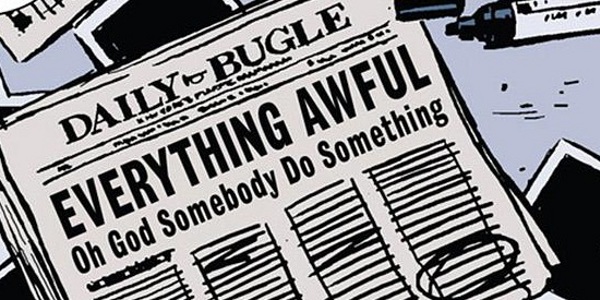
Your Daily Blend of Entertainment News
You are now subscribed
Your newsletter sign-up was successful
There's always been some tension between gamers and the critics covering their hobby. The past two weeks have been especially hostile. The term being used to sum up this conflict is "#GamerGate," currently trending on Twitter.
Twitter, of course, isn't really helpful in explaining what #GamerGate actually is. I checked Google last night and the first results were Gamersgate, a digital games shop that's probably not too happy right now, and this Wikipedia page about worker ants.
My later research was more fruitful, though, so here's the best summary I can come up with:
Worst Breakup Ever
The flash point of the current hostility was the blog of an indie developer's ex-boyfriend. He provided pages and pages of chat logs detailing their split and her infidelity. One of the men that she strayed with happened to be a game journalist. This personal drama resulted in a wave of different reactions. Most people following this drama subscribe to one or more of these points.
A) "This is none of our business. We shouldn't be talking about it."
B) "This developer is a horrible person. I'm going to tell her that as many times as possible and spread this story around."
Your Daily Blend of Entertainment News
C) "Harassment of this woman and others is why the gaming industry is dominated by males."
D) "This developer is part of a wider effort to ruin gaming."
E) "I don't think she should issue takedown notices for YouTube videos criticizing her."
F) "That journalist should resign."
G) "Developers and journalists are too cozy with each other. We need a new code of ethics for journalists."
H) "Journalists and developers are human beings. Some are bound to become friends or more because of shared interests, career changes, etc."
I) "None of the men this developer cheated with, including a married man, got nearly as much hatred from the Internet. The harassment she's endured just shows you the double standard we have in our society."
J) "Why aren't the press talking about this scandal? Why are forums shutting down discussion of it?"
K) "That indie developer torpedoed a pro-female charity."
L) "Hi, I'm Adam Baldwin."
This list isn't exhaustive but already encompasses arguments about misogyny, professional responsibility, privacy, the direction of the gaming industry and copyright. Coming to a consensus on one of those subjects is already impossible. Trying to hold all those debates at once is, well, a clusterfuck. The result looks more like a bar brawl.
It's Quiet. Too Quiet.
What didn't help matters is that the whole thing was poisoned by its catalyst: the invasion of a developer's privacy by her ex-boyfriend and the subsequent harassment by a small, vocal group. Journalists or forum moderators who would've ordinarily been interested to talk about ethics took a step back because they didn't want to further expose the developer to harassment.
More importantly, they don't want to give others the impression they condone harassment by giving these angry gamers publicity. That's not an irrational fear. The Internet's terrible at nuanced discussion so saying "I don't agree with the hostile rhetoric but I agree that game journalists need a code of ethics" is going to be read by someone as "Harassment's fine as long as you've got a few valid points mixed in there, too."
So, there was silence. Many sites didn't touch the subject. Discussion threads about the subject were shut down. The hope, I suppose, was that the controversy would burn out without any home. The unintended result, though, was that people got madder. The silence became the story. Gaming sites' refusal to talk about the controversy seemed to some gamers to be further confirmation that they were too chummy with developers and would do anything to protect them. Elaborate conspiracy theories were spun. The conversation shifted to Twitter, where 140-character limits on posts made it even harder to hold a rationale, straightforward discussion.
That Thing You Like Is The Worst
When many game sites did finally weigh in this week, they did so with editorials proclaiming that the time of gamers was past. Gamers are "over", "dead" or "being left behind" depending on who you ask. The common thread among the many, many articles is that hardcore gamers are angry because they're coming to grips with their own growing irrelevance. These "wailing hyper-consumers" aren't happy that the industry is becoming more diverse and catering less exclusively to them so they're lashing out.
I don't think that any gamer would disagree with the fact that they share their hobby with some serious pricks. However, they didn't like being told that gamer culture is on the verge of a deserved collapse. The writers might think that "gamer" is an obsolete identity but plenty of people still describe themselves as gamers. The result is that they felt targeted by these opinion pieces even if the authors didn't intend such. They viewed this barrage of editorials as another case of aloof journalists looking down their noses at them. They felt they were being mocked by the businesses they patronize.
Some gamers have been responding with broad strokes of their own. They're organizing campaigns to convince advertisers not to support sites they don't like. Others circulate images of "Social Justice Warrior" websites that look like "Wanted" posters from the Wild West to facilitate boycotts. "He's wanted in three states for horse-stealin' and raisin' awareness of the plight of female developers!" If journalists don't support our interests, these gamers reason, let's just get rid of them. #GamerGate seems to be the term summing up this general dissatisfaction with the press.
We're Never Ever, Ever Getting Back Together
As messy as this whole controversy is, there's a humorous symmetry to it. The whole thing all started with an angry breakup blog from an ex-boyfriend. Now gamers and journalists are both writing breakup letters of their own. Each is declaring that they're over the other.
Even describing this as a situation with two distinct sides is a problem, though. As I said much earlier, gamers and critics alike have shared a wide range of opinions. There are journalists who think that their colleagues need to do a better job of distancing themselves from the industry they cover. There are gamers who defend their hobby from misogyny while still acknowledging that the industry could be more inclusive.
Unfortunately, these people aren't leading the discussion. The loudest voices that offer the simplest explanations get the most attention. They've managed to chisel the debate to an "Us versus Them." To these people, the conflict is very straightforward: they're either battling neckbeard virgins who hate women or self-righteous developers and critics that hate gaming. With that kind of attitude on both sides, it's no surprise that nothing productive is being said.
While some critics and gamers are insisting that they're never getting back together, they actually can't escape one another. There will always be gamers traveling to conventions or waiting in line overnight for the new console. If there's a game to care about, there are going to be people willing to invest tremendous amounts of time and money. These gamers want places where they can research these games and chat about them. There's always going to be someone getting paid to run those resources, whether it's a traditional gaming news site, YouTube channel or Twitch user. Critics and gamers alike will endure.
The people you consider misogynists or social justice warriors aren't going anywhere, either. Gaming isn't some frontier town you can carry people out of on a rail. People with opinions you despise will always exist. They might take the occasional Twitter break but they're never gone. We're all trapped here together thanks to a shared hobby we love for a thousand different reasons. Accept it and quit acting like dicks to each other.
Staff Writer at CinemaBlend.

